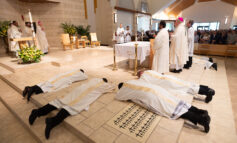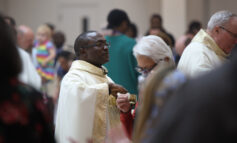By Bishop J. Douglas Deshotel
Special to The Texas Catholic
When I first learned the Ten Commandments preparing for first communion and first confession, I remember wondering why God’s name was so important that there had to be a commandment for it. I could understand a commandment about murder or stealing and even disobeying my parents. But as the saying goes, “What’s in a name?”
The commandment teaches us to always use God’s name with respect and honor, to be truthful in taking vows and oaths that use God’s name and not to use God’s name to wish evil on others. It even commands us to speak with reverence about the saints and holy things. What’s so special about a name?
We live in a very informal world today that does not put a lot of importance on names. No one thinks about casually using someone’s name, making fun of someone’s name or adding someone’s name on facebook or taking someone’s name off of facebook. People change their name to be movie stars and even sometimes write under a false name. This kind of casual approach to a name, however, hasn’t always been the case.
The name of a person used to have a very special meaning. The name of a person used to truly represent that person. It was as if a person’s name signified the presence of a person in the here and now. In times past, if two people were talking about another and used that person’s name, they were spiritually present in that conversation. Any abuse or disrespect toward the name of another was abuse and disrespect of that person directly. Any kind word or word of praise using a person’s name meant kindness and praise for that person.
Another important aspect about a name which has been lost in today’s casual culture is about relationship. To know the name of another person indicated a relationship between two persons. In some cultures it even created an obligation of hospitality and help to that person in time of need. Invoking that person’s name leant credibility and a good reference in communication with others. The name of a person was that person’s spiritual presence.
God’s name is sacred because it represents God and the sacred relationship God has established with us. In the Old Testament, God’s name was not even allowed to be pronounced because it denoted a familiarity that was unseemly between a mere mortal and the Almighty God. Only the high priest of the great temple in Jerusalem was permitted once a year to enter the Holy of Holies and mouth the name of God.
Jesus teaches us that the same God, who is being itself, created the world and everything in it is also in a special relationship with us as our Father. When we use God’s name in prayer, or when we invoke God’s name as a witness to the truth of what we say in important matters, we should always do that with utmost honor and respect for God’s name. To casually use the name of God or even worse to use it as a witness to a lie that we tell is to gravely use God’s name in vain. God’s name is precious treasure given for us to use reverently.
The Most Rev. J. Douglas Deshotel is an auxiliary bishop, vicar general and Moderator of the Curia for the Diocese of Dallas.



